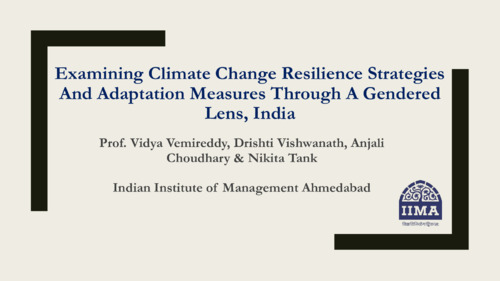Examining climate resilience strategies and adaptation measures through a gendered lens in India
Abstract
Climate change has emerged as a challenge that has risen up the global development agenda, with anticipated adverse impacts on agricultural production and food security. Furthermore its disproportionate impacts on women, contributing to increased work burden and adaptation challenges, have been documented extensively. Given this, the concept of ‘climate resilience,’ has gained traction in development planning. Several climate-resilient strategies have been identified in the literature in the context of food systems; these include adoption of improved varieties, water and nitrogen management, agro-ecological intensification, soil health improvement, micro irrigation, among others. In this study, we seek to: (a) map climate resilient and adaptation strategies, as well as recommended climatesmart agricultural practices documented across policy documents, extension and training manuals of the Indian government, as well as key intervention programs and priorities documented in the nongovernmental development organization ecosystem, with a focus on the state of Odisha; and (b) review gender considerations embedded, as well as the evidence of impacts of these strategies on women, in agriculture and food systems. We seek to understand how climate resilience has been understood through a policy and gender lens. This study develops a map of adaptation and resilient strategies through secondary information and data synthesis, and expands the same to include a contextual consideration of the ‘perception of resilience’—supported by primary field interviews and focused group discussions held with agriculture food systems stakeholders in Odisha, India. Finally, it indicates the areas wherein greater intervention is needed.

